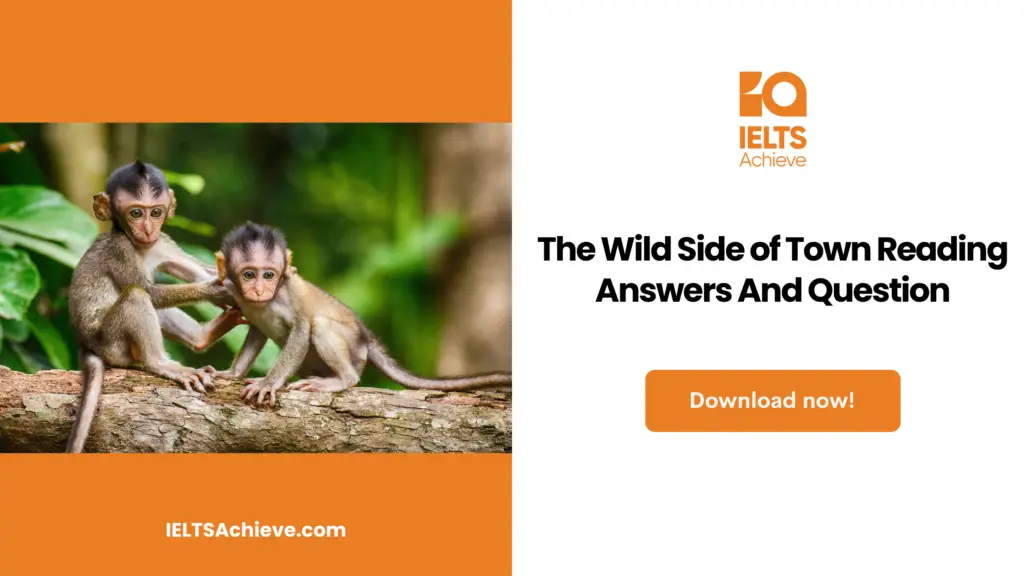The Blog post contains the following IELTS Reading Questions:
- IELTS Reading Locating Information
- IELTS Reading True/False/Not given
- IELTS Reading Sentence Completion
Stay informed and prepared for success – Explore our comprehensive Reading Test Info page to get valuable insights, exam format details, and expert tips for mastering the IELTS Reading section.
IELTS Reading Passage: The wild side of Town

The wild side of town
A. Much of Britain’s wildlife has experienced a fascinating reversal of fortune over the past half century. Cities have become a haven for wildlife as rural areas have declined economically. You can now visit the urban forest if you’re interested in seeing foxes or listening to the ethereal dawn chorus of birds.
B. The hare, the eagle, and the red deer are examples of species that can only be found in sparsely populated rural areas, but many of our native plants and animals thrive in the urban environment. Since the catastrophic extinction of so many species can be directly attributed to fragmentation and agrochemical pollution in the farming lowlands, this finding should come as no surprise.
C. Most urban parks, on the other hand, are a thriving mosaic of interconnected habitats that have been spared the worst of the pesticide revolution. Hedge removal on farms has resulted in the separation of populations and the extinction of many species. The intricate network of canals, railway embankments, road verges, and boundary hedges that knits the urban landscape together is an excellent ecological corridor for animals like hedgehogs, kingfishers, and dragonflies.
D. Parks and other urban recreation areas are increasingly being administered with wildlife in mind because of the value they provide for certain species. However, in many areas, they are overshadowed by the vast amount of ‘brownfield’ sites left behind by abandoned factories, landfills, quarries, and rail yards. Much of this has been spectacularly colonised with birch and willow woodland, herb-rich grassland, and shallow wetlands in Merseyside, South Yorkshire, and the West Midlands. Because of this, these formerly industrial landscapes are now home to a wide variety of wildlife, including songbirds and predators.
E. In the United Kingdom, 15 million backyards are tucked away. While some are still treated as if they were chemical war zones, the vast majority actually help the native fauna. The most successful plants are typically those found in forests, but woodland species, garden lawns, flower beds, climber-covered fences, shrubbery, and fruit trees make a good stand-in. Gardens, especially those filled with exotic flowers that extend the nectar season, can be preferable to the real thing in some ways. The natural seed supply can be supplemented with birdfeeders, and the only potential blemish on the otherwise idyllic scene is the domestic cats in the United States.
F. Since gardeners in Britain started practising “gardening with nature,” the resulting explosion of biodiversity has been nothing short of amazing to watch. The number of bird species observed at artificial feeders in gardens increased dramatically from 17 in 1990 to 81 by the year 2000. Twenty-five thousand garden ponds and ten thousand nest boxes are estimated to exist in the city of Sheffield thanks to the efforts of the BUGS project (Biodiversity in Urban Gardens in Sheffield).
G. Finally, we’re starting to see that urban wildlife habitat is an essential part of maintaining human health. The urban forest acts as a natural air purifier, while also slowing the rate of runoff during rainstorms thanks to the canopy’s ability to deflect water. Wetlands and ponds are essential to sustainable urban drainage because they collect stormwater runoff and filter it while also providing habitat for a variety of wildlife that helps keep the water clean. There is now empirical evidence that interacting with native wildlife in one’s immediate vicinity can help alleviate feelings of stress and resentment. Patients who can see trees or grass outside the window of their hospital room heal more quickly and report less discomfort.
H. When people in the UK think of nature preservation, they usually picture something that is on the periphery or located in the countryside. We’re just now starting to make it a priority in urban environmental and economic policy. Dozens of plans have been developed to establish new habitats and revitalise existing ones in and around our major cities. The London Wetland Centre, located in the city’s southwestern quadrant, is just one example of the city’s commitment to preserving its rich biodiversity.
I. The Wildfowl and Wetlands Trust has devised a novel plan to convert a defunct Victorian reservoir into a nature preserve. Only five years after it opened, the Centre had already been designated as a Site of Special Scientific Interest by the government of England for its exceptional preservation and presentation of natural resources. It’s a 105-acre wetland site with various wetland habitats like grazing marsh and shallow, open water. More than 104 different bird species have been spotted at the site, including the bittern, which is considered a national rarity.
J. The very essence of sustainable development is recognising that if we work with wildlife, wildlife will work with us.
Unlock your full potential in the IELTS Reading section – Visit our IELTS Reading Practice Question Answer page now!
Recommended Questions:
Renewable Energy IELTS Reading Question with Answer
The wild side of Town Reading Questions
Questions 1-3
Choose THREE letters A-G.
Write your answers in boxes 1-3 on your answer sheet.
In which THREE ways can wildlife habitats benefit people living in urban areas?
A. They have the potential to make cities greener.
B. They have the potential to improve the climate.
C. They have the potential to improve human well-being.
D. They have the ability to extend the flowering season.
E. They have the ability to absorb excess water.
F. They have the potential to attract wildlife.
G. They can contribute to the cleaning of the urban environment.
Questions 4-9
In boxes 4-9 on your answer sheet write
TRUE if the statement agrees with the information
FALSE if the statement contradicts the information
NOT GIVEN if there is no information on this
4. There is now more wildlife in UK cities than in the countryside.
5. Rural wildlife has been reduced by the use of pesticides on farms.
6. In the past, hedges on farms used to link up different habitats.
7. New urban environments are planned to provide ecological corridors for wildlife.
8. Public parks and gardens are being expanded to encourage wildlife.
9. Old industrial wastelands have damaged wildlife habitats in urban areas.
Enhance your skills in identifying information as True, False, or Not Given. Click here to discover expert strategies and techniques for mastering this question type in the IELTS Reading section.
Questions 10 -13
Answer the questions below using NO MORE THAN THREE WORDS AND/OR A NUMBER FROM THE PASSAGE.
Fill in the blanks 10-13 on your answer sheet with your answers.
10 What kind of wildlife benefits the most from urban gardens?
11 What kinds of garden plants can help birds and insects?
12 What poses a risk to wildlife in urban gardens?
13 How many bird species have been spotted in urban gardens recently?
Unlock your full potential in the IELTS Reading section – Visit our IELTS Reading Practice Question Answer page now!
Recommended Questions:
Renewable Energy IELTS Reading Question with Answer
The wild side of town Reading answers
1. C
2. E
3. G
4. Not given
5. True
6. True
7. Not given
8. Not given
9. False
10. Woodland Species
11. Exotic Flowers
12. (Domestic) Cats
13. 81

We hope you found this post useful in helping you to study for the IELTS Test. If you have any questions please let us know in the comments below or on the Facebook page.
The best way to keep up to date with posts like this is to like us on Facebook, then follow us on Instagram and Pinterest. If you need help preparing for the IELTS Test, join the IELTS Achieve Academy and see how we can assist you to achieve your desired band score. We offer an essay correction service, mock exams and online courses.

